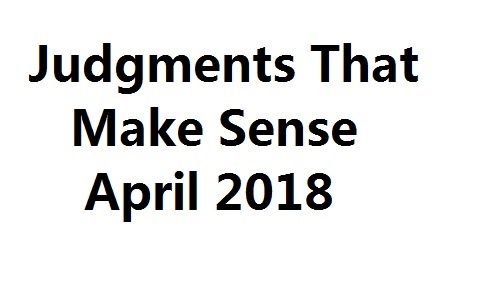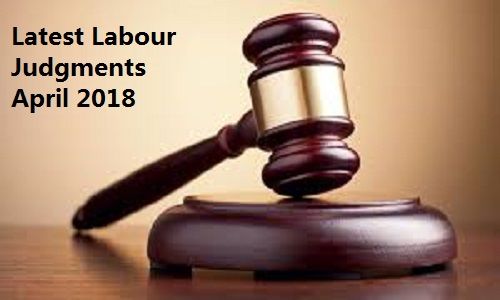GUIDELINES FOR HOLDING OF ENQUIRY
A domestic or department enquiry has to be conducted conforming to the principles of natural justice and giving the workman reasonable opportunity of defence, otherwise it would be held to be invalid. Justice should not only be done, but should manifestly and undoubtedly be seen to be done. Justice can never be seen to be done if a man acts as a judge in his own cause or is himself interested in its outcome. No man should be a judge of his own cause is the principle of natural justice and apply to the exercise of quasi judicial as well as administrative powers. The Rule is of a wide application and means that a judicial or quasi-judicial authority should not only himself not be a party, but must also not be interested as a party in the subject matter of the dispute which he has to decide.
Arjuna Charan Mishra vs. State Bank of India and others, 2001-II LLJ 605 (Ori. HC)
ADVANTAGES OF A SETTLEMENT BEFORE CONCILIATION OFFICER
A settlement arrived in course of conciliation proceeding, being product of collective bargaining, is entitled to due weight and consideration. Ignoring such settlement can only be exceptional, that is, if it is unjust, or mala fide. Accordingly challenge to a clause in a settlement, which had been reached in the course of conciliation proceedings providing life-long pension under the scheme was confined to those who retired on or after a certain date. Granting the benefit of life-long pension prospectively or with limited retrospective effect, did not make the settlement unjust or unfair.
I.T.C. Ltd. Workers’ Welfare Assn. vs. Management of I.T.C. Ltd. and others, 2002-I LLJ 848 (SC).
FACTORS FOR FIXATION OF RETIREMENT AGE IN STANDING ORDERS
In fixing the age of superannuation industrial tribunals have to take into account several relevant factors. What is the nature of the workers assigned to the employees in the course of their employment? What is the nature of the wage structure paid to them? What are the retirement benefits and other amenities available to them? What is the character of the climate where the employees work and what is the age of superannuation fixed in comparable industries in the same region? What is generally the practice prevailing in the industry in the past in the matter of retiring its employees? These and other relevant facts have to be weighed by the tribunal in every case when it is called upon to fix an age of superannuation in an industrial dispute.
Guest Keen Williams (P) Ltd. vs. Sterling (P-I) Ltd., 1959 (II) LLJ 405 (SC).
ESI CORPORATION – LIABLE TO REIMBURSE ENTIRE MEDICAL EXPENSES
Wife of insured under the Employees’ State Insurance Act, 1948, undergone treatment in Government as well as Private Hospital. Reimbursement claim was partly paid by the ESI Corporation as per CGHS rates. The ESI Corporation challenged the judgment of the EI Court in appeal in allowing the claim. The Division Bench of the High Court held that as per section 57 of the Act, the State Government or ESIC is to fix a scale for reimbursement of any medical benefit but none had fixed any such scale. No provision is there in section 57 to adopt CGHS rates. As per sections 56 and 58 of ESI Act, ESIC or the State Government is liable to provide medical facility to the insured and his family members. The insured is not liable to pay any amount to tie-up hospital. When there is no facility either in ESI run hospital or in tie-up hospital, treatment taken from another hospital having required facility cannot be rejected. Hence, ESI Corporation is liable to reimburse the entire medical expenses.
Secretary, State Government, Labour Department rep. by The Director of Insurance Medical Services, ESI Scheme Trivendrum vs. S. Gopakumar s/o Soman Pillai & Ors., 2018 LLR 236 (Del. HC)
A DIRECTOR IS LIABLE TOWARDS EPF DUES UNLESS HE PROVES NOT TO BE INCHARGE OF DAY TO DAY AFFAIRS OF THE COMPANY BY COGENT EVIDENCE
Director challenged the prosecution, initiated against him by the EPF Authority for non-remittance of EPF dues by the Company, on the ground that he was an independent Director of the Company and not incharge of day-to-day affairs. The learned Single Judge of the High Court observed that such a plea taken by the petitioner is based upon fact of the case to be decided by due trial. Unless it is proved by way of cogent evidence that a director is not incharge of day-to-day affairs of the company, he cannot be absolved from the liability towards remittance of EPF dues by the Company in writ proceedings. Petitioner is to take up such a plea before the trial court by way of cogent evidence. A plea before the Writ Court without cogent documentary evidence is not sustainable. Hence, petition is disposed of accordingly.
Raveendranathan Prabha vs. Enforcement Officer, Employees’ Provident Funds, 2018 LLR 327 (Ker. HC)
Courtesy Labour Law Reporter



